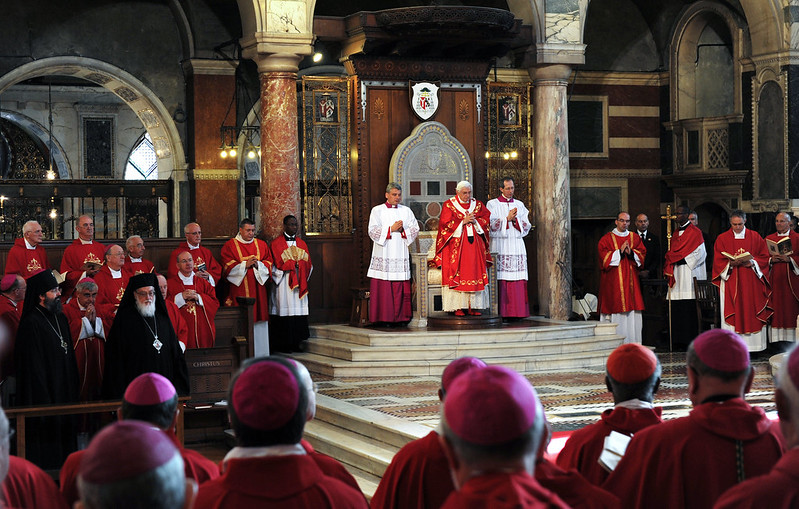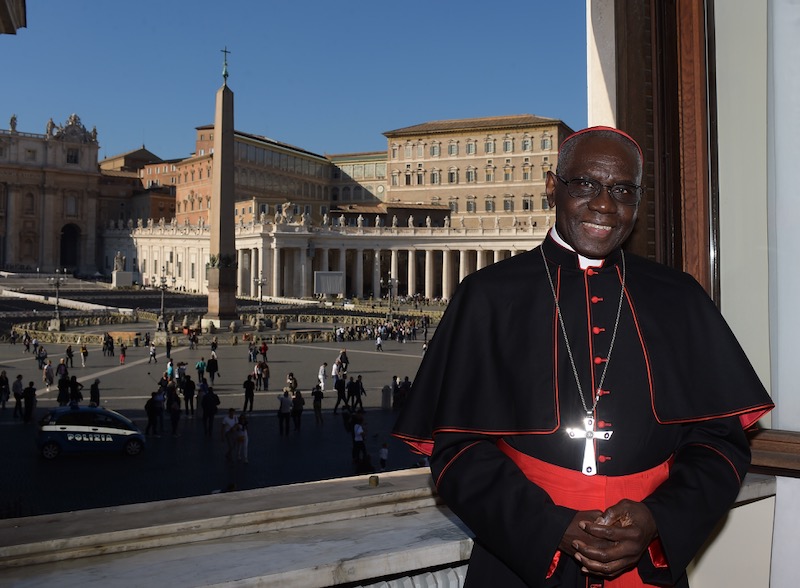In a letter that explains the Church’s view of the right relation- ship between ecclesial and civil authority, Cardinal Robert Sarah has written to the presidents of all the bishops’ conferences describing the conditions under which celebration of the Eucharist should be restored.
Pope Francis approved the letter from the prefect of the Congregation for Divine Worship and the Discipline of the Sacraments on 3 September. The letter itself is not in the register of an instruction, but its title, “Let us return to the Eucharist with joy!” has the form of an impera- tive. Cardinal Sarah praises the bishops for the way they have handled the shock of the pandemic, and what it has meant for Catholic worship, but welcomes the resumption of the communal celebration that provides the essential spiritual food of the faithful.
“Even the hardest trials can bear fruits of grace,” the cardinal says. “We have accepted our distance from the Lord’s altar as a time of eucharistic fasting, useful for us to rediscover its vital importance, beauty and immeasurable preciousness.” But with that lesson learned, “as soon as is possible, we must return to the Eucharist ... with an increased desire to meet the Lord.”
While virtual Masses have per- formed a valuable service, Cardinal Sarah says such liturgies “risk distancing us from a personal and intimate encounter with the incarnate God ... This physical contact with the Lord is vital, indispensable, irreplaceable”.
Therefore, “once the concrete measures that can be taken to reduce the spread of the virus to a minimum have been identified and adopted, it is necessary that all resume their place in the assembly of brothers and sisters”.
Sarah suggests safety measures that will help the “rapid and safe” return to eucharistic celebration, but warns: “Due attention to hygiene and safety regulations cannot lead to the sterilisation of gestures and rites, to the instilling, even unconsciously, of fear and insecurity in the faithful.”
Here the role of the bishops will come into its own: “It is up to the prudent but firm action of the bishops to ensure that the participation of the faithful in the celebration of the Eucharist is not reduced by public authorities to a ‘gathering’, and is not considered comparable or even subordinate to forms of recreational activities.”
The bishops “were prompt to make difficult and painful decisions, even to the point of suspending the participation of the faithful in the celebration of the Eucharist for a long period,” he continues. Now, they are called to be defenders of the liturgy. Citing the Vatican II constitution on the liturgy, Sacrosanctum concilium, Sarah makes clear that civil authorities cannot legislate on liturgical norms.
Moreover, liturgical celebrations should not include “improvised ritual experiments”; the faithful have the right “to receive the Body of Christ and to worship the Lord present in the Eucharist in the manner provided for, without limitations that go even beyond what is provided for by the norms of hygiene issued by public authorities or bishops”.
The cardinal does not shy away from citing “obedience” as the sure way to avoid error. “In times of difficulty ... bishops and epis- copal conferences can give provisional norms which must be obeyed. Obedience safeguards the treasure entrusted to the Church. These measures ... expire when the situation returns to normal.”
Finally, Sarah places concern for public health in its correct context: “The Church unites proclamation and accompaniment towards the eternal salvation of souls with the necessary concern for public health.”



 Loading ...
Loading ...